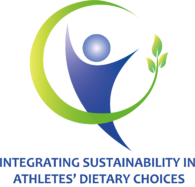The food industry is one of the sectors with the greatest impact on climate change.
A healthier and more sustainable EU food system is a cornerstone of the EU’s Green Deal with its Farm to Fork and Biodiversity strategies in order to achieve a complete overhaul of the EU’s food system towards achieving climate neutrality by 2050 and the new milestone target of 55% reduction by 2030.
Athletes and active individuals have only recently been included in the discussion of sustainable diets.
While it is important that athletes meet dietary guidelines to maintain health and improve performance capacity, studies show that athletes exceed protein intakes, are prone to follow food trends, and use a large number of dietary supplements, especially protein powder. But protein intake, and especially animal protein, is one of the hotspots when talking about sustainability and food. Furthermore, as highlighted in “Sustainable Diets for Athletes”, at the moment very few sports nutrition recommendations and guidelines include sustainability and/or integrate the environmental impact of food choices in a quantifiable manner. Therefore, the integration of sustainability in athletes’ diets can no longer be avoided. In addition, athletes are role models for society and could become a strong voice for planetary health.
